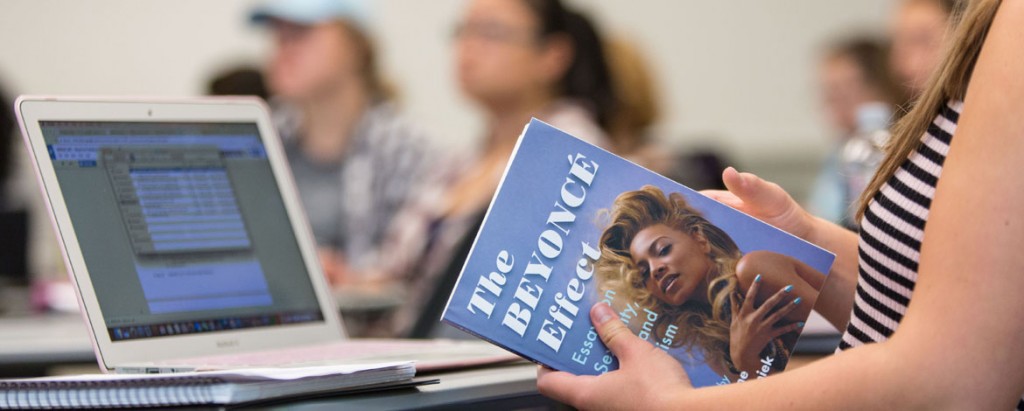Page 1 • (12,634 results in 0.062 seconds)
-
Music faculty and staff.
Jennifer Rhyne Associate Professor of Flute and Music Theory Full Profile 253-535-7058 rhynejl@plu.edu
-
School of Music, Theatre & Dance faculty and staff.
Jennifer Rhyne Associate Professor of Flute and Music Theory Full Profile 253-535-7058 rhynejl@plu.edu
-
The Bachelor of Music in Composition is intended for those who want the maximum training in compositional technique possible at the undergraduate level. Students in this degree spend 2/
Bachelor of Music in CompositionThe Bachelor of Music in Composition is intended for those who want the maximum training in compositional technique possible at the undergraduate level. Students in this degree spend 2/3 of their time in music courses and receive a solid introduction to composition, theory, arranging, orchestration, counterpoint, historical styles and genres, ethnomusicology and the new tools of the electronic studio. They create a portfolio of scores, performance recordings and
-
Music faculty and staff.
Korine Fujiwara Visiting Instructor of Music, Strings, and Composition Full Profile 253-535-7602 korine.fujiwara@plu.edu
-
School of Music, Theatre & Dance faculty and staff.
Korine Fujiwara Visiting Instructor of Music, Strings, and Composition Full Profile 253-535-7602 korine.fujiwara@plu.edu
-
No courses in music (MUSI) may be taken for credit by examination. First-Year Students Students intending to major in music should begin the major music sequences in the first year.
, triads, diatonic 7th chords, basic analysis, etc. (2) MUSI 136 : Music Theory & Analysis II A continuation of MUSI 135. Further study of the materials and syntax of musical expression through an examination of harmonic and melodic analysis, composition, part-writing, figured bass, non-chord tones, small formal structures, secondary functions, etc. Prerequisite: MUSI 135 or consent of instructor. (3) MUSI 151 : Keyboard Musicianship I Beginning skills in piano and general musicianship in a group piano
-

Pacific Lutheran University students are people of many interests. Last fall semester, several courses illustrated how the university’s curriculum caters to those eclectic interests. One of these classes was Beyoncé and Black Feminist Theory. “Who Beyoncé is for?” is not usually a question that you…
other hundreds of hit songs that have made Beyoncé a worldwide music icon. But it was just one of the questions students tackled in the Women’s and Gender Studies course titled Beyoncé and Black Feminist Theory. “The general premise of the course is to think about Beyoncé as a social, political and cultural figure through the lens of black feminist theory,” said Jennifer Smith, PLU’s first dean for inclusive excellence. Smith co-taught the class with PLU’s Center for Gender Equity Outreach and
-
Helpful Links Here are a few links to get you started on writing your literature analysis paper: What is literature analysis (including a glossary of literary terms)? Purdue Owl: What Makes a Good
Literature AnalysisLiterature analysis is the cornerstone of many college classes, in subjects ranging from English literature to history. Literature analysis papers as you to consider how and why a literary text was written and conveys some kind of message. The ability to take apart a text and break it down into its separate parts enables you to judge how effective an author’s argument is, what symbols or motifs are important throughout the novel, poem or other text, and ultimately, to
-
Composition news for Pacific Lutheran University.
Horn & Fixed Media Premiere at Octave 9 in Seattle Professor of Music Dr. Gina Gillie recently premiered her first electroacoustic music composition at Seattle Symphony’s Octave 9. Titled “Pale Blue Dot for solo horn and fixed media,” the piece is inspired by the 1991 photograph taken by the Voyager 1 spacecraft as well as… October 5, 2022 Composition
-
Every assessment tool will produce particular forms of data. Matching, tool, data, and analysis strategy is critical to getting valuable information that will help you answer questions about what/
Data Analysis StrategiesEvery assessment tool will produce particular forms of data. Matching, tool, data, and analysis strategy is critical to getting valuable information that will help you answer questions about what/how students are learning in your classes. See the table below for some common data types with corresponding data analysis strategies. Contact the director of assessment for help selecting assessment tools and/or analysis strategies. Data TypeAnalysis Strategies Test
Do you have any feedback for us? If so, feel free to use our Feedback Form.


